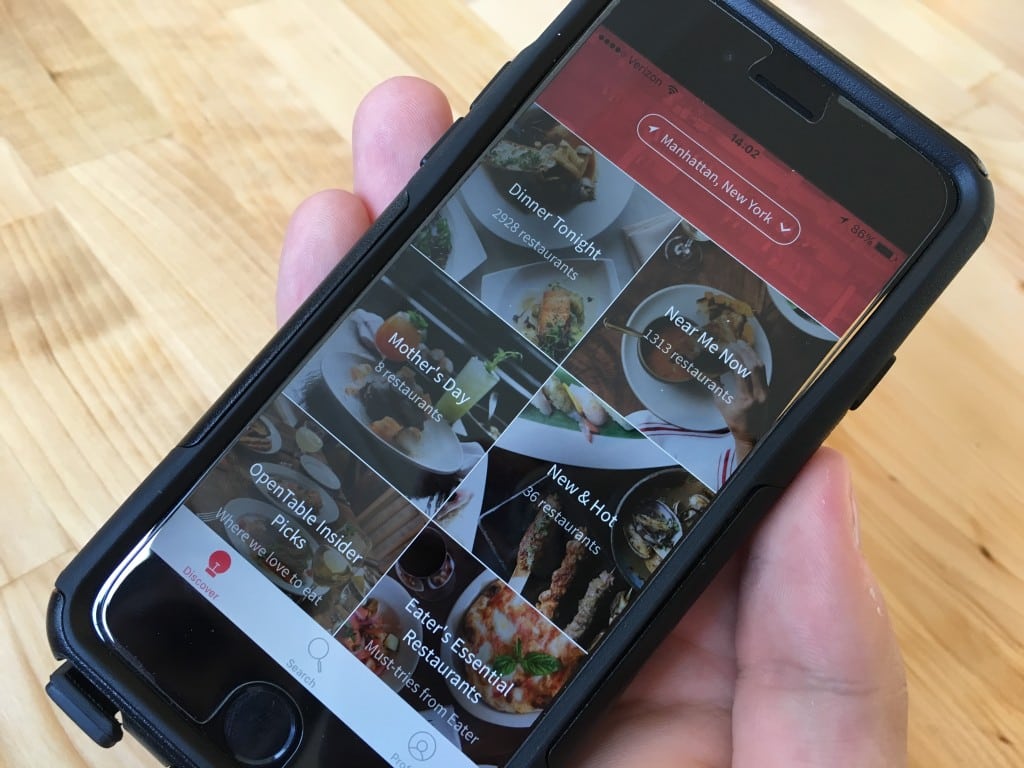OpenTable Wants to Own the Entire Dining Experience But Personalization Will Come Later

Skift Take
OpenTable describes its app update in iTunes as a product customers use to "discover, explore, reserve, and manage restaurant reservations free and instantly — anytime, anywhere" -- emphasizing "discover and explore" before "reserve."
The phrasing isn't casual as OpenTable wants to be known as more than a dining reservations platform and wants to cover the entire dining experience. Customers can now browse curated lists and recommendations within the app.
Curation, rather than personalization, is the core feature of OpenTable's new app iteration. For the first time, OpenTable's app features a Discover tab that organizes nearby restaurants into various categories, including recently opened restaurants, top-rated restaurants and those recommended by OpenTable insiders and food critics.
Under this tab, customers can also see restaurants with immediate availability in real-time and those with available tables for dinner that evening in a Dinner Tonight area.
"We think this is just the beginning and personalization will happen over time that's not there today," Christa Quarles, OpenTable's CEO, told Skift.
Quarles became CEO in November 2015 after serving as interim CEO since September and CFO since last May. "There's no artificial intelligence embedded currently, [this update] is really about creating a set of curated experiences that will help inform us about how diners are using us. But you can imagine that using the app in your own city or backyard would be different than how you're using it when you're traveling and on the road."
"I think this will depend on the city that you're in, so I think there's a fair amount of personalization that could happen over time that's not there today. Being able to tailor specific types of collections to specific individuals is an important pathway that we could potentially take."
Expanding OpenTable Internationally
Quarles said OpenTable is in "experimentation phase at the moment" with The Priceline Group, which acquired OpenTable in 2014 for $2.6 billion, as both the brand and the Group work to bring the travel and dining experiences closer together. OpenTable has struggled to expand globally at a pace that was initially expected when it was acquired.
For example, for now the update is only available in OpenTable's English-speaking markets, including the U.S., the U.K., Australia and Canada.
Quarles said the next step is creating an app experience where every customer can use the Discover tab in their native languages in more markets. That also means getting more reviews in various key languages. To that end, the company ended its relationship with Yelp last year so it can build out its own reviews and take charge of the entire customer experience.
"Reviews are a critical part of what we bring in terms of the value of the content today," said Quarles. "We have something like 38 million reviews today on OpenTable. We want to make it easier for diners to leave reviews but we also want to do it in a mobile way. We start by asking, 'How was the experience?' from one to five stars. More of our diners are coming to us from a mobile device than from desktop so we've also done some things around sending a follow-up that comes back to you a couple days later. That way you can leave a longer review when you're in a place where you can type more easily. All of our reviews are verified."
"It's also one thing to do a bunch of research, but if you don't have that availability, if you don't have bookability, then all of the research is kind of for nought. Through our own consumer research, we found that consumers don't want to spend more than three minutes trying to find a restaurant. So if you make that difficult and make it difficult to book, then it's no fun."
Considering the experiences of travelers versus locals is another crossroads the company is at, "I don't know if they're hugely different," said Quarles. "Part of it is, when I'm on the road I want to know where [locals] go to eat actually. So if you're a traveler in New York City one of the categories we think about is local favorites and what does that end up looking like? You may not want that if you live in New York because you may already know what those are, but if you're a traveler that's particularly important."
"And it may be that that traveler is a business traveler and a leisure traveler and I think it's important to distinguish between that as well. If you're having an important business lunch, we at OpenTable should be able to help you through meta tags and search capability to help you understand where is a good place to close that big business deal."




